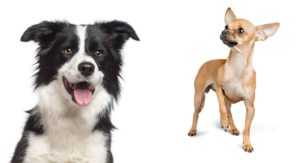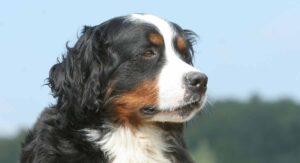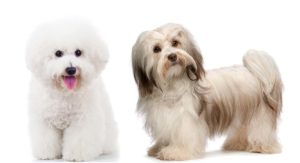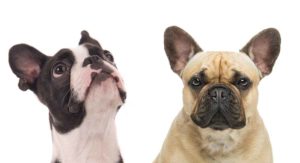The fawn Doberman Pinscher has a pale coat caused by the dilute gene. Fawn Dobermans are also sometimes called Isabella, or fawn Isabella. This coloring is combined with rust coloring to express the Doberman’s typical markings. For this recessive color fading trait to be expressed, your fawn Doberman’s parents needed […] Read More
Parti Miniature Schnauzer
A parti Miniature Schnauzer has patches of white fur in their coat. Parti coloring is not recognized by the official breed standard for the Mini Schnauzer. So this coat pattern is somewhat rare for the breed. But a purebred parti Mini Schnauzer is likely to share all the same great […] Read More
Border Collie Chihuahua Mix
The Border Collie Chihuahua mix hybrid designer dog breed is usually created by mixing a male Chihuahua with a female Border Collie. Many people have begun to fall in love with these hyper, adorable dogs. But, without the proper care, they can be quite the handful. The Border Collie Chihuahua […] Read More
Skinny Dogs
Most skinny dogs come from breeds that naturally do not carry a lot of weight. Many of the skinniest dog breeds come from the Sighthound group, and have been bred for generations to sprint. Running incredibly fast, in short spurts, to catch prey such as hare or rabbits. However some skinny […] Read More
Terrier Breeds
Terrier breeds include a group of dogs that were bred to be strong, hard working and full of spirit. They are mostly quite small, sturdily built and packed with personality.ContentsTop Terrier breedsTerrier mixesNaming your Terrier puppyAre Terriers healthy dogs?Food and feeding.Bred originally to help with pest control, guard property and […] Read More
From Puppy To Full Grown Beagle
The full grown Beagle is a small hound, weighing 20 – 30lbs and standing around 13 to 15 inches tall. They are friendly, lively and loyal dogs, which makes them a great pet for active homes. You can expect your bouncy buddy to live up to around 12.5 years. Today […] Read More
The Schnauzer Lab Mix
The Schnauzer Lab mix combines the purebred Schnauzer with a pedigree Labrador Retriever to produce a seriously unique litter of puppies. They will have thick, short coats that will usually be black, chocolate or grey in color. Your Schnauzer Lab mix puppy will have large floppy ears and a prominent […] Read More
Mini Doodles, Pocket Size Doodle Dog Breeds To Brighten Your Day
Mini Doodles have one Toy or Miniature Poodle parent, and another parent from a little dog breed. Small doodles are friendly, loyal and loving pets. These tiny Doodles are often low shedding too! Today we’ll share a complete list of Mini Doodle dog breeds. Looking at the pros and cons […] Read More
Rhodesian Ridgeback Pitbull Mix
The Rhodesian Ridgeback Pitbull mix has one Rhodesian Ridgeback parent and another parent from one of the Pitbull type breeds. They can make an excellent family pet for the right owners, but this mix is not for everyone. Active adults and families with older children are a better match for […] Read More
Great Bernese – Your Great Pyrenees Bernese Mountain Dog Mix
The Great Bernese is a Great Pyrenees Bernese Mountain Dog mix. This is a large dog that has a calm and patient personality, while at the same time being a good protector. They come from working roots, and are built to cope well in harsh climates and form strong bonds […] Read More
Blue Poodle Colors, Breed Traits and Care
The blue Poodle has a uniquely silvered black coat and a loving, affectionate and lively personality. This athletic companion pet and working dog is originally black, but their blue fur fades as they grow older. An adult blue Poodle will look more blue grey than black. Today we’ll share top […] Read More
Full Grown Cavapoo
Full grown Cavapoo dogs can weigh anywhere from 6 to 18lbs, and be from 10 to 15 inches tall. That’s a big range! Your Cavapoo puppy’s eventual adult size will depend partially on the type of Poodle parent they have, but also on how you raise them. Today we are […] Read More
Are Whippets Good Family Dogs?
Are Whippets good family dogs, or best kept in grown up households only? The Whippet breed has a relatively low profile, but they are brimming with qualities that make them good family dogs. They are affectionate, gentle, adaptable, and pretty low maintenance. I think every family should include a Whippet […] Read More
Havachon – The Havanese and Bichon Frise Mix
The Havachon is a cute crossbreed, combining a purebred Havanese with a pedigree Bichon Frise. These pale coated companion dogs are small, weighing around 12lbs and standing about 11 inches tall. They make ace apartment pets or lapdops, and surprisingly good watchdogs too. This active, trainable dog fits well with […] Read More
Cavachon – Cavalier Bichon Frise Mix
The Cavachon is a Cavalier King Charles Spaniel Bichon Frise mix. They either have one purebred Cavalier parent and one purebred Bichon parent, or are a second or even third generation Cavachon cross. These dogs are small, confident and very affectionate. They are usually small, with long hair, droopy ears […] Read More
Maltese Lifespan – How Long Can Maltese Dogs Live?
Maltese lifespan is widely reported online to be in the region of 15-18 years. Sadly, the reality is that scientific evidence shows average Maltese life expectancy is actually closer to 12.5 years. So why the misinformation when this is actually a pretty decent time for a pet dog to live? […] Read More
Boston Terrier French Bulldog Mix – The Frenchton
The Frenchton is a friendly, confident and popular little dog. A Boston Terrier French Bulldog Mix, Frenchton puppies are a cross between two well loved breeds. These confident dogs are loyal, loving and intelligent. Easy to train and motivate with positive reinforcement, they can learn tricks as well as they […] Read More
How Long Do Boston Terriers Live And How Can They Live Longer?
How long do Boston Terriers live? A casual internet search will tell you Boston Terriers live well into their teens, but sadly this just isn’t correct. According to scientific studies the reality is that the average Boston Terrier life expectancy is 10.92 years. For a small breed of dog, this […] Read More
Teacup Maltese
The teacup Maltese is an even smaller version of the Maltese breed. They aren’t an official breed, but instead a description of a dog that is less than the breed standard as an adult. They will usually be less than 7 inches tall and under 6 lbs when fully grown. […] Read More
Black Mouth Cur Lab Mix
Black Mouth Cur Lab mix dogs are medium sized, athletic and confident. They have short coats that shed freely all year round, and so need a good groom at least a couple of times a week. Their Black Mouth Cur and Labrador Retriever parents are intelligent working dogs, and these […] Read More
- 1
- 2
- 3
- …
- 16
- Next Page »



















